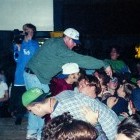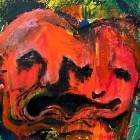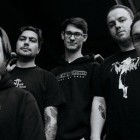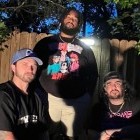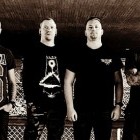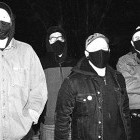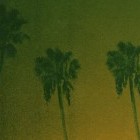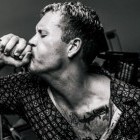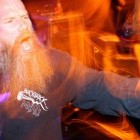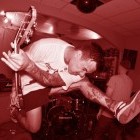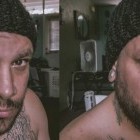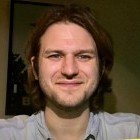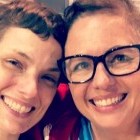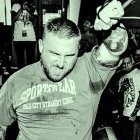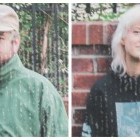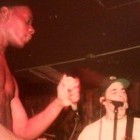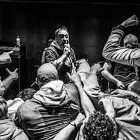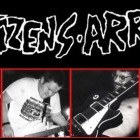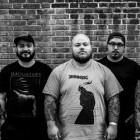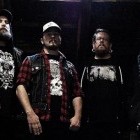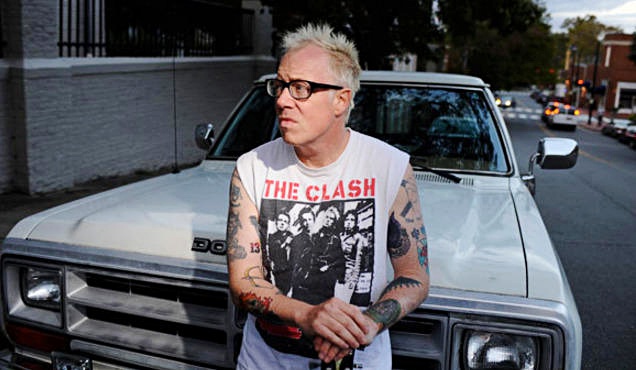
I first heard Dave Smalley's voice sometime in the late '80s when I started listening to punk and hardcore music. It was Can I Say, the seminal album from Dag Nasty where he handled lead vocal duties. After falling in love with his distinct performance style, I started doing my pre-Internet research and went through his earlier discography with Boston hardcore heroes DYS, and eventually lost my mind for Allroy Sez, the debut album from ALL, and sadly, the only full-length Dave sang on with that outfit.
Since the '90s, Dave has headed Down by Law, a melodic punk band whose material also brings to mind the '70s power pop of the early Stiff Records singles. Never one to sit still for too long, the veteran musician recently formed a new hardcore unit called Don't Sleep, releasing a self-titled EP that has been getting a ton of love in my office in the last few weeks.
I've never had the chance to interview Dave before, so after a string of text messages and some delays, we finally got on the phone in late December. He was gracious enough to let me grill him about his life in and outside of music, and I'm thrilled to share the conversation with everyone.
It’s a pleasure to finally catch up with you, Dave. I’ve been trying to juggle schedules with my wife and watching our kids. I know you relate!
Oh, I totally understand that. My oldest is 23 and my youngest is just two. So, there’s a huge range there for me [laughs].
Well, not that we have some time, let’s get started. I always go in chronological with these things, so tell me a bit about your childhood. Were you the kind of kid that watched a ton of television when you were really young, soaking everything in?
I wasn’t in front of the TV a lot, but I was definitely one of those kids that would wake up really early on Saturday mornings to watch cartoons. I’d watch stuff like the Banana Splits show [The Banana Splits Adventure Hour] and the Jackson 5 cartoon [The Jackson 5ive]. I used to really like that stuff. I’ve always loved cartoons and comic books.
You mention the Banana Splits and Jackson 5, so did you find yourself gravitating towards music-based shows? I loved The Partridge Family when I was really young.
Yeah, I watched The Partridge Family, and like every other kid my age in American at that time, I had a huge crush on Susan Dey, you know, Lori Partridge. I was just telling someone the other day that my parents used to watch M.A.S.H. when I was a kid, and I didn’t realize it at the time, but watching it as an adult, and listening to its theme song, it was really a depressing, mournful show. I know I must be blaspheming to a lot of people right now, but M.A.S.H. was a thoroughly depressing show [laughs]. The theme is just dreadful and should be filed under the Most Miserable Songs of All Time [laughs].
How about music as a kid? What kind of bands and musical genres loomed large back then for you?
I was into rock music pretty early on. I got into KISS, Alice Cooper, Lynyrd Skynyrd... let's see... the Beatles were huge for me. I used have the white album [The Beatles], plus red [1962–1966] and blue [1967–1970] compilations from them and I would play them till the record player fell apart. I was recently listening to Endless Summer by the Beach Boys and it might be the best greatest hits album of all time. Well, that and Gold & Platinum by Skynyrd. I also listened to a lot of stuff that helped me to learn how to sing, stuff like James Taylor and Chicago.
Were your parents pretty hands off when it came to what you listened to as a kid?
They were really cool and had a huge role in my musical life because they exposed me to musicals at an early age. Singin' in the Rain, Guys and Dolls, The Sound of Music, Seven Brides for Seven Brothers, all those classic musicals were part of my childhood. But, yeah, my parents were always cool about getting me records for Christmas and birthdays, and stuff like that. My elementary school teacher also found out I could sing and made sure I was always in the plays and singing.
That's great that both of your parents were both so supportive and exposed you to so much music.
Yeah, and in fact, I remember when I was in Dag Nasty and both my parents came to see us play at the 9:30 Club. I told my mom before theu came, don't wear your fur coat. But what did she end up doing? Yep, she wore the freaking fur coat! [Laughs] I loved that she did that because she wouldn't let me browbeat her. My father had saved up to buy her that as a present, which was a big deal because they didn't have a lot of money. Anyway, I remember seeing them by the back door watching us, my father holding my mom while she was wearing that fur coat. But the point is that they came out to support me. I though, "right on, Mom and Dad!"
HEAR STRIFE COVER A CLASSIC SONG FROM VOID
Your father worked for the U.S. government, right?
Yeah, he worked for different parts of the government, and the last post that he had was in the State Department post in Africa. Then he retired after that. They retired to a beautiful area in France called Brittany, which is near Normandy. They had a this great little house by the water.
But your childhood was primarily spent in the Washington, D.C. area?
We mostly lived in Virginia. In those days, Virginia was more true Virginia. Northern Virginia now is just crowded and bad traffic. It used to be a great area to grow up in. You would go hiking in the woods, along the creeks, for miles, which I would do all of the time. Now it's just another suburban hellhole.
SEE ALSO: 2017 interview with Timmy Chunks (Token Entry, Let Rage!)
Going back to music, how did you come to discover punk and metal music? Did you have someone that would help turn you onto to stuff?
Yeah, like I said earlier, I had already been listening to stuff like Alice Cooper and the Doobie Brothers, but I started getting into harder-edged music. I think that's just a natural evolution when you're like in 8th and 9th grade and you start questioning your world a little bit. You start rebelling against home rules, you know, all of that. I was also always reading the newspaper and was seeing what was happening in the world at the time. I still remember the Iranian hostage crisis and my parents watching that on the news every night. Anyway, you start getting a sense of what is right and wrong in the world.
I had a friend named Eric Neil who had an older brother was playing a lot of music for him. All of a sudden, I started learning about the Ramones, Clash, and even new wavey stuff like Plastic Bertrand. He had a song called "Ça plane pour moi" which was great. Do you know that one?
Yeah, and I have to say, that's the only song I know from Plastic Bertrand!
[Laughs] That's also the only one I know! If you gave me a $100 bill and asked me to name another Plastic Bertrand song, I couldn't do it [laughs].
OK, you were saying about the early punk and new wave stuff you first loved.
Yeah, it seemed like someone had lit the powder keg of music throughout Europe during that time, and a little bit in New York, but I really didn't like the New York bands that much. Let's see, I liked the Ramones, but I didn't like Talking Heads, and most of that era in New York music wasn't really my thing. Well, I did like Richard Hell and the Voidoids a lot. But man, that early punk and new wave scene from the late '70s was incredible. It was the perfect storm for me.
I don't want to take up your time examining every single bit of trivia related to the bands you played in, but let's start off with DYS, the first band everyone knows you from. I've always thought the cover art to the Brotherhood album was a bit creepy. What's the story behind it?
Really? Interesting. Well, as you know, the Boston Crew was a very small but tight group of people back then. There's that line on the DYS album: "the Boston Brotherhood is me and you." Plus, we were all straight edge, so that implies a certain degree of severity. So, what can be more severe and draconian and fraternal than monks? We had a few people draw up different cover ideas for the album, and the one we picked ended up being done by Dicky Barrett, who at the time was in Impact Unit, but later went on to huge success with The Mighty Mighty Bosstones. We wanted to convey the idea of brotherhood through the monks.
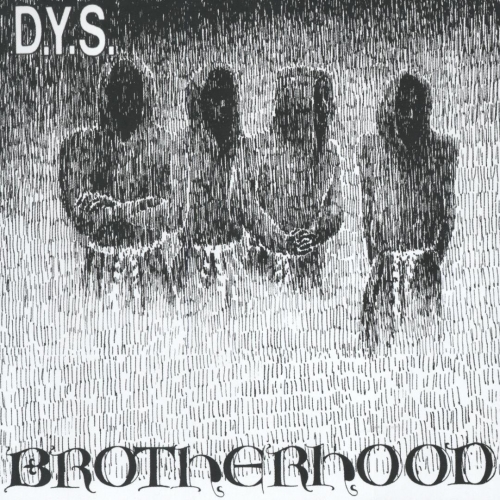
Well, now that you explain it, that all makes sense. To me, it looks more like something you would see on the cover of a heavy metal album than a hardcore one. But I've always thought it was cool.
The lunatics at Maximum Rocknroll always hated DYS because we talked about lifting weights to Black Flag followed by Iron Maiden followed by AC/DC followed by SSD [laughs]. We made no apologies about that and it would drive those intolerant Maximum Rocknroll people crazy. But I will never apologize for being a metalhead and rock and roller. It's just part of my DNA.
It's interesting because by the time I got into hardcore when I was in junior high in the mid to late '80s, the crossover was already on its way, but I know the generation before mine got all bent out of shape about the whole thing.
Well, metal and hardcore are musical brothers, aren't they? Why wouldn't you listen to Slayer and then listen to Agnostic Front after that? There are huge musical tie-ins between hardcore and metal.
Since the band evolved so quickly, in a stylistic sense, was there ever a point where you guys considered changing the name from DYS to something else?
We kind of did that, if you think about it. The first album said "Department of Youth Services" and the second one just has "DYS" on it. I think Shakespeare said, "to thine own self be true," and the whole idea of hardcore was to be yourself. You listened to this kind of music and you could be yourself. You would go to shows back then and see spiky hair people, skinheads, jocks, Billy Idol-looking guys, normal-looking guys, just every kind of music fan you could think of. It was diverse. Hardcore was a movement and spirit that encouraged you to follow your own drummer. That's huge.
So going back to your question, no, DYS didn't need to change our name because we were following our own path. We were growing as musicians. We found out that we were pretty darn good as a rock band, actually. Not that many bands were doing that back then, certainly some of the Boston bands did, like SSD and Gang Green. But for the most part, there weren't that many bands at that time that were interested in trying to do what we were trying to do, which was, "hey, we like Metallica and AC/DC and ballad rock..." We had grown up on that stuff. It wasn't like we were trying to imitate anything, it was just something that we wanted to try.
What were you doing outside of the band stuff with DYS during that period? I know you were in college at the time. Did you hold down a job as well?
I worked all through college, yes. I have always been a working-class kind of guy. I've never wanted to be a trust fund kid, not that I ever had a chance to be [laughs]. But I don't think I would have liked that anyway. Even now, I see these ads for vacation spots of people laying on a beach, and I would be out of my mind in a day [laughs]. So going back to DYS, yeah, I worked at Newbury Comics all through college.

What was your major in college?
I majored in Communications and Journalism.
LISTEN TO GHOST WORK (members of Seaweed, Snapcase, Minus the Bear)
When DYS ended, was there a positive feeling of closure, or was it messier than that?
One of the beautiful and cool things about DYS was that it had a very natural and funny beginning with Jonathan [Anastas] and I, and it had a very natural ending. I remember we all went to a diner kind of place called Charlie's in Kenmore Square that unfortunately isn't there anymore. We used to go there after practice. Anyway, we all sat down together one night and we all kind of said, "Yeah, I think we should call it." You know what I mean? It was all very peaceful. We then finished our hamburgers and it was all fine. There was no fighting. We felt that we had put out two very powerful records and made our mark. It was just a point where everyone wanted to go there separate way.
What was your next move after you graduated college and DYS broke up?
After I finished college, my parents had moved into what the Descendents would call a typical "suburban home" in D.C. proper. I moved in with them and I remember that was also the time I sold a lot of my record collection because like most kids after finishing college, I was broke. I remember the guys at the store were like, "oh my gosh!" because I had stuff like Misfits singles and all of that. I still remember the two things that I kept were the first Minor Threat single in red, and then the first Clash album. That one might have been a reprint, but it was valuable to me. I think I got like a couple of thousand bucks for everything.
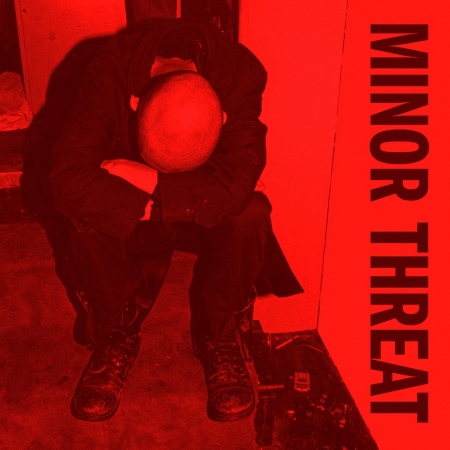
At what point did Dag Nasty enter the picture, and how old were you?
I was 21. I had gotten to know Brian [Baker] during the Minor Threat days through DYS. You have to remember that back then, hardcore was such a small world. I remember he had just recorded the Dag Nasty demo and we were driving around in his red Honda one day. I loved the songs. The band then asked me to roadie for them, so that's how that all started.
You eventually became the singer of the band, which ended up showcasing the full-on melodic side of your voice.
I feel like the great thing about Dag Nasty on the Can I Say album is that chemistry of me, Brian, Roger [Marbury], and Colin [Sears] at that time was truly magic. I don't say that in an egostical kind of way. I just think that we all felt it between us. Each of us had sort of crossed a musical river to get to where that band was. Brian wanted to not hold back anymore. He wanted to play guitar the best he could at the point, which, by the way, was pretty damned good. Same thing for me. I had all the rage of a hardcore singer, but by the way, I know how to sing. I wanted to do what came naturally to me when I heard that music.
What are your memories of recording the Can I Say album? Do you remember tracking vocals and all of that stuff, or is it a blur at this point?
No, I remember it well. It was done at the old Inner Ear Studios which was in the basement of [engineer] Don Zientara's house. His kids were there. It was a unique and great vibe there. Ian [MacKaye] produced the album.
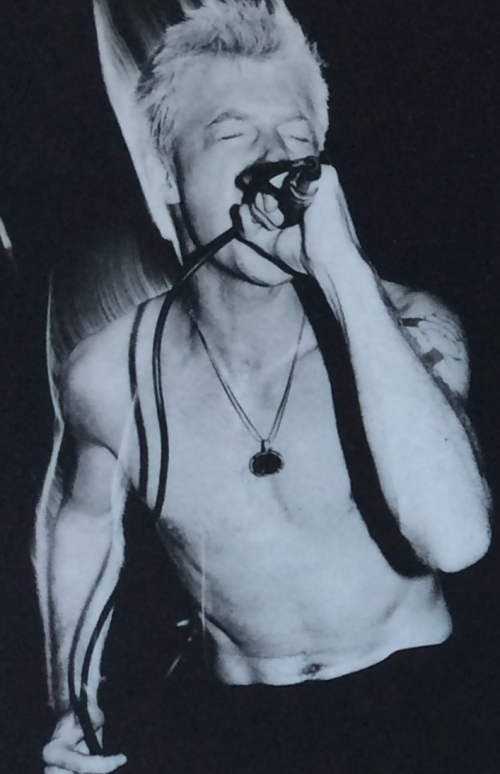
You mentioned that he produced Can I Say, so what was it like working with Ian MacKaye?
There's one thing that stays in mind, that Ian probably won't remember. It meant more to me as a fan of Ian than it would for him. But I had just finished a vocal take and I looked over at Ian and he was looking down and shaking his head. I went into the control room and asked what was up. I figured he would say something like it wasn't any good, or to try again, like a producer is supposed to do when they think you can do better. Anyway, he says to me: "I was just thinking to myself that this is one of my favorite Dischord records of all time." That meant a lot to me. It was a very special thing to hear.
If the chemistry between the four of you was so strong, why didn't that lineup of Dag Nasty end up lasting longer?
People always have those "what if..." moments in life, and Dag Nasty is definitely one of those for me. No regrets, but definitely a "what if." When I had graudated college, I had quite a bit of student debt, and my parents had taken some loans out as well. I wanted to go to grad school, and while I was still just being a roadie for Dag, I had applied to a few schools. Then we made Can I Say and had this incredible explosion of music, rage, and to quote Megadeth, "a symphony of destruction." [Laughs] Anyway, all of a sudden, I got into grad school, but not only that, I got offered a full scholarship. At that time, it was for NYU. Brooklyn College was the other one. These days, you would try to do both things. You would go to school and use vacation days and weekends to do the band stuff. But we were stupid back then. I just don't think we really thought it through on how to make it work. Would have I done things differently if it were now? Yeah, I think I would.
Did you end up going to NYU for grad school?
No, I ended up getting a great opportunity to go to Israel for school for my first year. It was great because I had always had an interest in Middle Eastern politics, and very supportive of the idea of democracy in the desert. Also, I was a supporter of Israel, not blindly, but definitely generally. It was a great experience.
I imagine that at that time in the '80s, there weren't a ton of hardcore kids living in Israel.
[Laughs] Not at all. I was in a different world. I lived 5 minutes from the Wailing Wall. I was tear-gassed in a riot once. Well, I wasn't in the riot, but I was walking by and there was a Palestinian protest happening when all of a sudden, I hear the sound of the cannisters firing. I was this innocent, naive little guy and couldn't believe what was happening.
SEE ALSO: Punks at Heart: 10 Musicians Who Owe the Underground
What did you think of Wig Out at Denko's, the album Dag Nasty made after you guys parted ways?
[xXx Zine editor, writer] Mike Gitter had sent me a copy of Wig Out while I was still living in Israel. I remember listening to it late and night and my girlfriend was asleep. Well, I cannot tell a lie, but I cried. The reason I cried was that some of the songs we had been doing before I left the band. Then there were the songs that I wished I had sang on. So, it was a double-sense of regret and longing, and wishing that I had been the guy doing that, and feeling like, "Oh, I would have done this or that differently." That's not a diss on how it was done, it's just I would have put my own interpretation into it.
How did you then go on to become the singer of ALL?
Again, I think it was Mike Gitter who had gotten in touch with me and he mentioned that [ALL drummer] Bill Stevenson was trying to get a hold of me. If memory serves me right, Mike put us both in touch on the phone. I ended up speaking with Bill multiple times for hours. I'm sure his phone bill was hundreds of dollars. He basically made me an offer I couldn't refuse, which was basically that the Descendents were going on hiatus and they were starting a new band called ALL and that I was the singer. [Laughs] There wasn't any "would you like to be the singer?" kind of thing going on. He said that once I was done with my year in Israel, to come out to California and become the singer of their new band.

I would assume that Bill's enthusiasm to get you in ALL was based on the strength of your vocals on the Can I Say album since it was on the melodic side of the sonic spectrum?
I was still in Dag, we had played with the Descendents, and before that, I had known Bill from his days in Black Flag through playing in DYS. So, we knew each other already.
Were was ALL based out of when it started? Also, do you remember some of the first songs you guys jammed on when you first started working together?
We lived in Lomita, CA, which is in the South Bay. I think they had some songs that they had already been working on that ended up going on the first album [Allroy Sez]. I want to say that "Sex in the Way" was one, and maybe "Pretty Little Girl." [ALL bassist] Karl [Alvarez] was always prolific in his songwriting.
Tell me a bit about that time in ALL.
The cool thing about that time was that the four of us were living a full-time musicians. We were all living together in a tiny office space in a strip mall. The rehearsal space was behind the office area. Our living quarters was basically like a walk-in closet kind of thing with four bunks in there. It was great because we were able to write all the time. Everybody was writing, a lot. Sometimes we would jam out a song and it would end up becoming something. But with Billy, he would work so hard on his songs to get them exactly a certain way. I especially remember that with the song "Just Perfect."
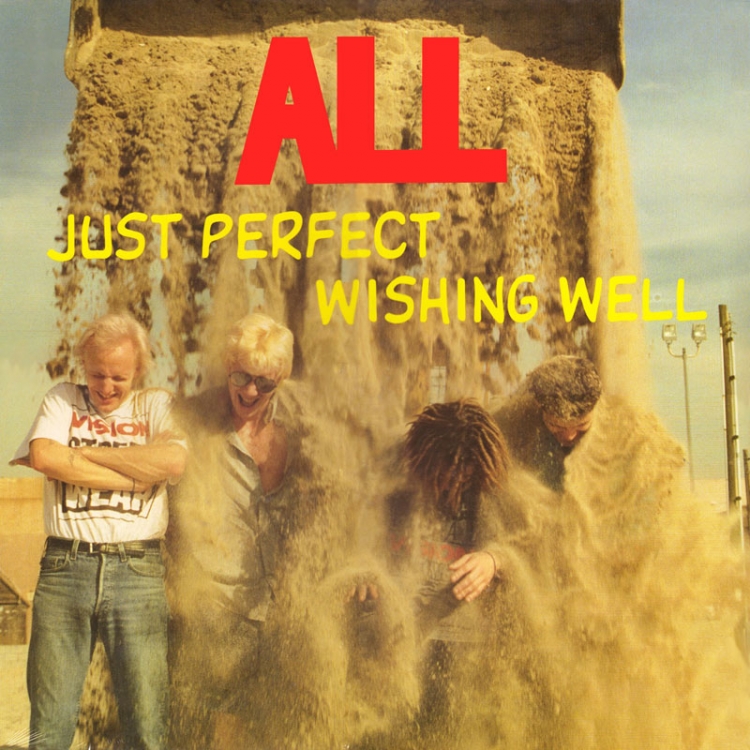
"Just Perfect" is one of the all-time best ALL songs. It's a classic.
He worked on that song for months because he wanted it—please excuse the pun—just perfect. That wasn't one of the songs that came out of us jamming together. Every part of "Just Perfect" was meticulously crafted by Bill over many weeks.
Allroy Sez came out in 1988, but you didn't go on to make another album with ALL. What ended up happening?
I think it was 1989 and it was just a case for me where I had been in DYS, where our longest tour was something like 10 days, and then Dag Nasty did a few week-long tours here and there. All of a sudden, I would be on these month, 2-month tours with ALL where we struggled. I didn't care so much about that, but where I'm going is that it was hard. Literally you would be figuring out whether you could buy a Big Mac or just go for the hamburger at McDonald's. I didn't really want to spend most of my life out on the road at that point. I was in love with the people and the music we were doing, but I didn't want to tour anymore at that time. I remember talking with Billy and he totally got it. It was very friendly and painless.
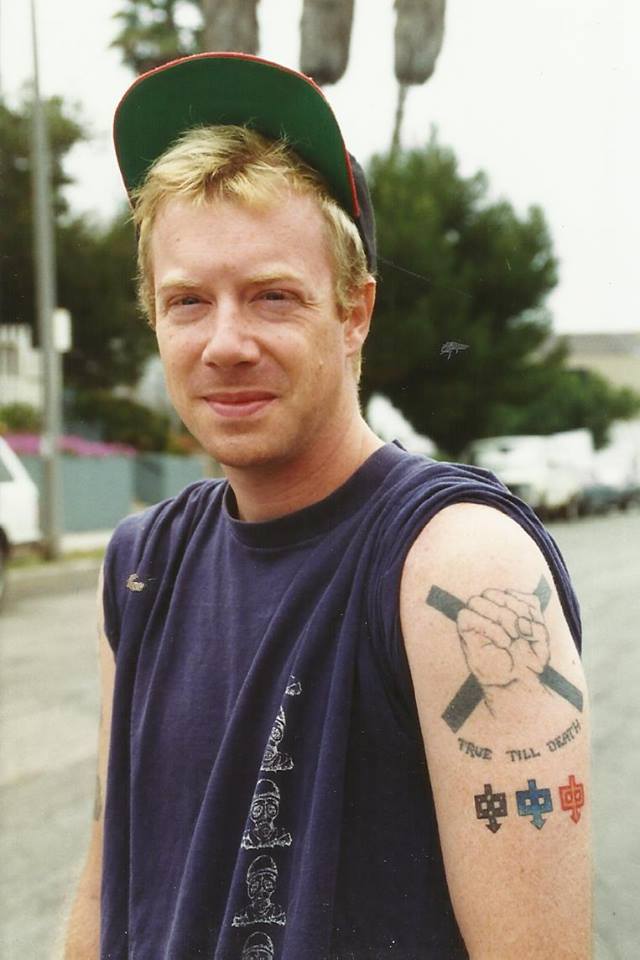
That takes us to your next band, Down by Law. That started out as a side project at first, right?
When I was still in ALL, we were all good friends with the guys in the band Chemical People. I was still writing after I had left ALL, and I had the song "Right or Wrong." It was one of those things where it doesn't matter if you're an accountant or a musician or whatever, if you're honest with yourself, you know when you've done a good job on something. Well, that's how I felt about the song "Right or Wrong." I didn't want to just keep the song on my little Tascam 4-track recorder. So, I ended up calling Dave Naz and asked him to jam on it and they did. Then I wrote a few more songs and we started playing shows.
How did the deal with Epitaph Records happen?
[Epitaph Records founder] Brett Gurewitz was at one of those early shows and on that night, it was just one of those shows where everything was on fire. The vibe was just perfect. After the show, Brett brought us out to his car to talk and the next thing I knew Down by Law was on Epitaph.
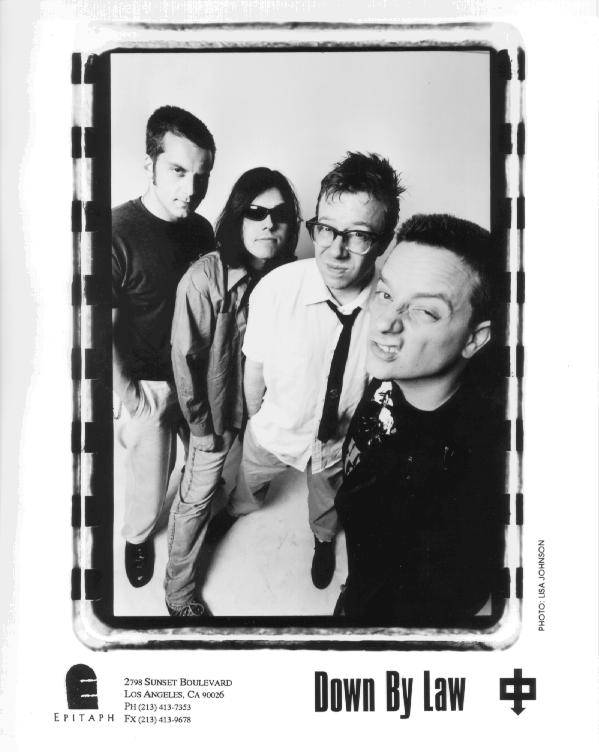
It's interesting, but Down by Law was the first band you played in that you made it past the two-album mark with the self-titled and Blue coming out right after each other in 1991 and 1992, respectively. The third album, Punkrockacademyfightsong, ended up being very successful and introduced many people to the band.
When we were making Punkrockacademyfightsong, it was the same kind of feeling I had when Dag was making Can I Say. There was an unspoken electricity happening while we made Punkrockacademyfightsong. It's kind of New Age-y to talk about it, but it really was special.
All Scratched Up is another album that has top-to-bottom quality material. Down by Law was firing on all cylinders between writing, recording, and touring. Were you doing the band on a full-time basis back during those years, or did you have to hold down a day job as well?
For a while, DBL was a full-time band. I was also in grad school during some of tha time at Cal State in Los Angeles. That was great because instead of semesters, they had the quarter system there, which was great for a musician. It allowed me to go out on tour for three months and then come back and still do my studies. It took me something like six years to get my masters, but that's because I was doing all of the DBL stuff [laughs].
When did you have your first kid, and how did that change how you approached the whole band thing?
My oldest daughter was born in 1995 and that definitely changed my perspective on how much I wanted to tour. Both of my daughters were born in Southern California. I missed their first steps because I was probably in Cleveland or whatever, but that's great, because I've been lucky enough to be able to have people care enough to come out and see me play. But one of the things about being a parent is that it's the most important thing you'll ever do. That's how it should be. If you're responsible enough to have a child, that's your gig. You just changed everything. That doesn't mean you have to change who you are, but the point is your most important priority is putting a roof over their head and making them know that they're loved and protected. So, yeah, it does change you. If it doesn't, you're an extremely selfish person.
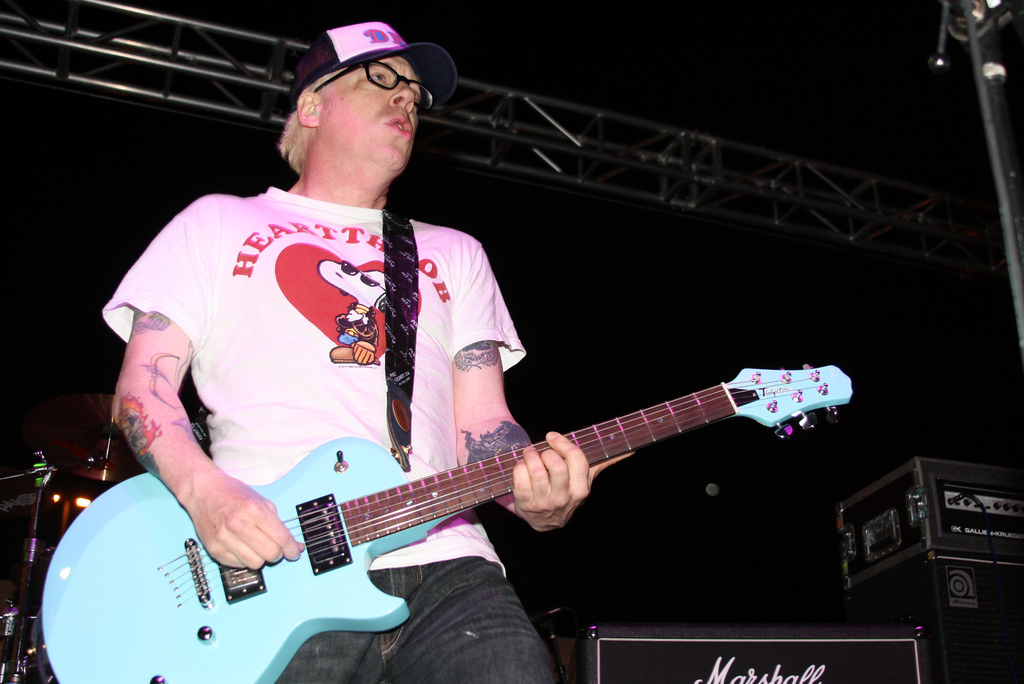
We've finally reached the point in this conversation where we talk about your latest band, Don't Sleep.
This whole band has been a pleasant surprise. You can't program where the lighting is gonna come from. That was definitely the case here. Garrett [Rothman], the bassist, sent me a note on Facebook saying that he was in a band called Very Americans and that they were big fans of mine and that if I had time, they would love for me to check their music out. I'm not sure how to describe their music, but I guess it's kind of like Elvis Costello meets My Bloody Valentine. No no, that's not good either, but they're very good! Anyway, I heard the first song and thought that it was great, especially with my love for power pop. By the time I heard all of the songs they sent me, I felt like it was the best new thing I had heard in 2-3 years. I wrote them back right away and then we ended up setting up a solo show where they're from in Harrisburg. I played solo and then for the encore, they came up and joined me on some Dag songs. It was a great night and I got to know them over dinner because we were strangers before that show. Then we started playing more shows together and it was going great.
How did it go from playing these hybrid shows where you were playing Dag Nasty/ALL/DYS/Down by Law songs with them as your back up band to becoming Don't Sleep?
I don't remember who said what first, but I think Tony [Bavaria] and Tom [McGrath], who are the two guitar players, wrote a few songs. They sent me the music with the drums, bass, and guitars and I wrote a vocal melody over it. It was one of those things where you kind of know after a certain point when you know something is clicking. The stuff we were coming up with was definitely old school and part of who I am, it's just that I haven't been able to unleash the beast for a while. So, I guess it's unleash the beast time again [laughs].
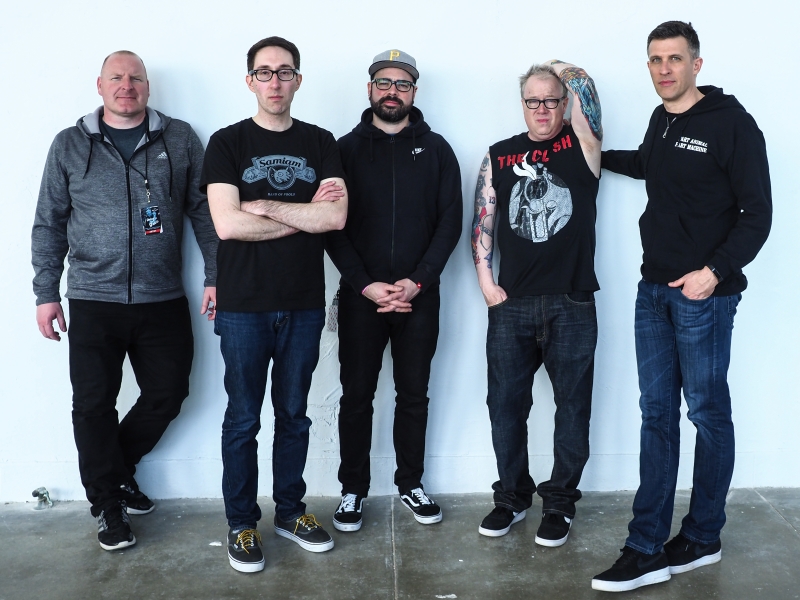
What's the plan for Don't Sleep on the shows and touring front? Are you going to be more of a weekend run kind of band at this point?
I don't know exactly yet. I have children to see and take care of. Touring is something I like doing when I'm on the stage. The hour before to the hour after and in between is great. I love communicating with and meeting people at the shows. It's the greatest thing in the world. The driving, hotels, and sound checks... that stuff I am not into. At least not as much as I was back in 1986, or 1996, for that matter.
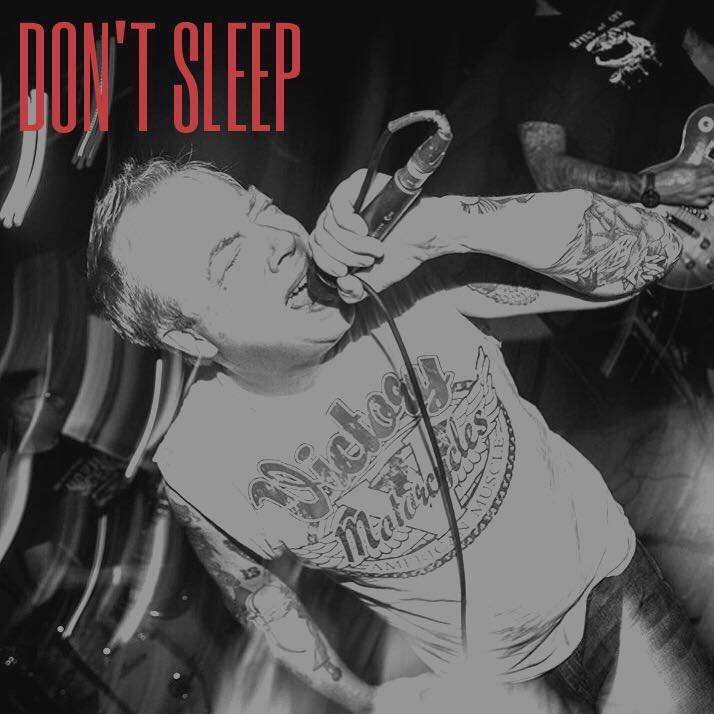
Well, like Howard Stern would say, "you've said it all." Thanks so much for taking the time out for this. I just have a couple of fun questions to close out. Since you've had such an extensive discography so far, I was curious to know if you had to pick a song of your's that you think that you think might have been overlooked upon its release, what would it be?
Let's see, there are two Down by Law songs that come to mind. One of them is called "Far and Away" and the other is "Concrete Times." I really like the lyrics in both of those songs. We never did those songs live. But I remember when we were recording "Far and Away," there's a low and high harmony and I knew in my head what it should sound like. I did the low harmony first and the producer says: "This isn't moving me and isn't as good as some of the other ones." Anyway, I went in to do the second harmony part and the second it was done, the producer comes into my headphones: "I was wrong. I suck. This is great!" [Laughs] It just shows you how you don't know how the painting is going to look like till you actually finish it.
So, yeah, those are two songs I've written that I think are pretty cool.
The last question: What's your favorite hardcore record of all time?
Wow, there are so many great ones. There are the emotional ties to [SSD's] Get It Away, and then you have the first Circle Jerks album [Group Sex]. All of the early Marginal Man and Government Issue records are great. I'm going to go with the first Suicidal Tendencies album. That combined rock, metal, hardcore, and the angst of being a kid so perfectly. I'm to going to go with that one today.
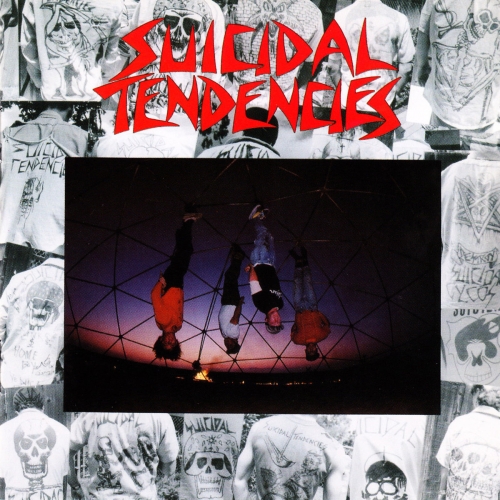
***
Don't Sleep's eponymous 7-track EP is a European exclusive and is out now via Unity Worldwide Records and available for sale through CoreTex. In early 2018, the band will be dropping Bring the Light, a 7" featuring two songs off the Euro release and one brand-new song. Pre-orders for the new 7" are up now on Reaper Records.
Tagged: all, dag nasty, dave smalley, descendents, dont sleep, down by law, dys

